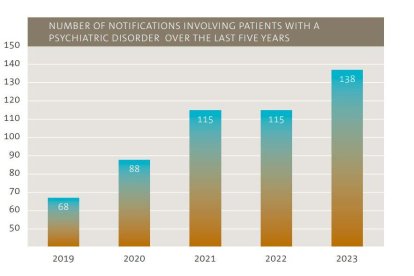The state euthanasia machine: Over 30,000 assisted deaths in a single year
The Netherlands, Canada, California... more and more national and local governments are allowing euthanasia, an issue that may become one of the next big debates in the United States.

Anti-euthanasia demonstration in front of Westminster Hall in London
"A sad and shameful day for the English speaking world." This is how Mike Johnson, speaker of the House of Representatives, defined the parliamentary vote in the United Kingdom that brought the country closer to assisted suicide.
The Republican acknowledged during the week that, at the moment, there is no similar federal legislation in Congress. However he cautioned, in words picked up by Local News:
"But it’s going to have to be part of the dialogue going forward because as the trend continues I think we need to stand out for the respect for life, and that’s an important thing to me and I think to a lot of my colleagues," he said.
Shortly before M.P.s voted on their own law in the U.K., a survey by British media outlet The Telegraph calculated the global total of assisted suicides and euthanasia cases at 30,000 people a year.
Although all the cases counted occurred in countries where the practice is legalized, regulations vary by national territory and, in the case of the United States, by state. In some nations, as many as one in 20 deaths were by assisted suicide.
The Telegraph data shows an upward trend, both because new countries are joining the legalization process and because the rules are becoming more flexible. Among the most controversial cases, some legislation makes minors and adults with mental disorders eligible to die with aid from the state.
Euthanasia, assisted suicide or assisted death?
While they all describe a death authorized and executed by a state, in "assisted suicide," the patient consumes a lethal dose provided by a physician, whereas in "euthanasia," the professional delivers the drug, for example by injection.
Euthanasia, however, is also often used as an umbrella term for both cases.
The word suicide is often rejected by politicians and pro-euthanasia activists, who prefer the term "assisted death."
Netherlands
It was the first country to legislate state-assisted suicide, with the Termination of Life on Request and Assisted Suicide Act.
Since then, it has become the scene of some of the most talked-about cases, such as that of Zoraya ter Beek, a 28-year-old suffering from depression and autism, who was told by her doctors that she would never get better. She died in May this year. Or that of a former prime minister and his wife, who, after more than 70 years of marriage, requested joint euthanasia. It was granted in February.
Or that of two minors, who were around 16 and 18 years old. Little else is known, because the government claims identity protection.
The rules were extended in April to cover children between the ages of 1 and 12 who undergo "unbearable suffering." Amsterdam estimated that would be between five and 10 such cases each year. While between the ages of 12 and 16, "the parents or guardian must indicate whether they agree with the child's request for euthanasia," 17 and older parents need only be "involved in the decision-making process." If the child is unable to request it, the parents can do so instead.
There were a total of 9,068 state-facilitated deaths in 2023, the latest year with data from the Regional Euthanasia Review Committees, a committee charged with collecting and reviewing such cases. That figure represents 5.4% of the total number of deaths that year.
Of these, 8,860 were at the hands of physicians. In 190 cases, the patients themselves took charge, with substances supplied by the state. And there were still another 18 in which patients ingested the lethal substance but did not die within the agreed-upon time frame, resulting in a doctor killing them.
Some 8,042 people had somatic conditions, mostly cancer (5,105) and neurological disorders such as Parkinson's (605). Eight people were in such an advanced stage of dementia that they could not give consent. Another 138 suffered mostly from "psychiatric disorders."
It is not allowed just because a person wants to end his or her life, without first demonstrating, or at least arguing, physical or psychological pain. At least, so far: parliamentarians will analyze a project to allow those over 75 to apply for it if they consider their life is "complete."

The number of New Zealanders who pleaded "psychiatric" pain for euthanasia has been growing.
Canada
"We are seeing Medical assistance in dying (MAID) being abused," acknowledged from a group that had campaigned for euthanasia in Canada, where it was approved in 2016. In 2021, it was also granted to people with disabilities and in 2027 it is expected to be expanded to those suffering from mental disorders.
Those words of regret from members of the British Columbia Civil Liberties Association (BCCLA) were revealed by The Telegraph in October this year. Its members were concerned about how doctors coerced their patients into ending their lives. In one case, they claim, a woman had a request for assisted suicide approved because she had lost her hearing.
One of the most permissive bits of legislation, it is also one of the most criticized. In Ontario, one of the most devastating reports emerged, in which a committee of experts detected several cases of patients who were granted euthanasia because they felt isolated or feared becoming homeless. In one case, a 50-year-old woman asked to die primarily because "she could not get proper housing," reported the AP, who first uncovered the report. The request was granted. In addition, the study revealed that the people most likely to request euthanasia came from the poorest areas.
In the absence of official confirmation, the group Euthanasia Prevention Coalition estimated that in 2023, there were 15,280 assisted suicides in Canada. This represents 4.6% of all deaths. This figure also represents an increase of 15% over 2022, which in turn represented an increase of 31.2% compared to 2021.
Taking these numbers into account, since the measure was approved, there have been a total of 60,238 assisted suicides.
In 2022, it was even the fifth-leading cause of death, according to a study by the Canadian think tank Cardus. It tied for the spot with cerebrovascular disease, ranking behind cancer, heart disease, COVID-19 and accidents.
United States
The Supreme Court ruled in 1997 that assisted suicide was not a constitutional right. Therefore, each state can decide whether it is legal within its borders.
The District of Columbia and 10 states allow some form of assisted suicide. They are California, Hawaii, Montana, New Mexico, Washington, Colorado, Maine, New Jersey, Vermont and Oregon.
The latter two also allow it for nonresidents. According to Vermont Department of Health data collected by CBS News, 26 people who died with aid from public resources between May and June 2023 were from out of state. That's 25% of the total. In Oregon, the number was 23, just over 6% of the total, according to officials. Thus, as happens in other cases such as abortion, some state governments manage to have a national impact with their local policies.
There are activist groups that even offer checklists of recommendations to consider before taking the deadly route to Vermont, Oregon or other countries. There are also groups, such as Death With Dignity, that provide recommendations ranging from "create a will and an estate plan" to planning funeral details: Who do you want to speak, should there be music, what kind, etc.? They even have model laws for state legislators to draft their own proposals.
Although data collection varies by state, the number of deaths is considerably lower than in other countries. But, as Johnson warned, it could grow: at least 19 other states are considering laws to allow assisted suicide.




























